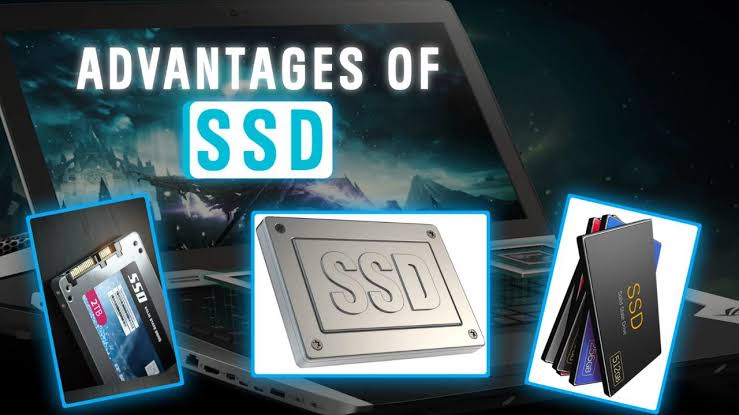Solid-state drives (SSDs) have revolutionized storage landscape in both laptops and PCs. Unlike traditional hard disk drives (HDDs) SSDs use flash memory to store data. They offer numerous advantages in terms of speed, durability and overall performance. This article explores various benefits of SSDs. It explains why they have become preferred choice for modern computing.
One of the most significant benefits of SSDs is their speed. SSDs are dramatically faster than HDDs. They provide quicker boot times. There are faster file transfers. Enhanced overall system responsiveness. Absence of moving parts allows SSDs to read and write data at speeds much higher than those of HDDs.
With SSD operating system and applications load much faster. Boot times can be reduced from several minutes to just a few seconds. This improvement is particularly noticeable in systems with large operating systems or complex applications. Faster load times mean less waiting. More productivity. Making SSDs ideal for both personal and professional use.
Enhanced Multitasking
SSDs significantly improve the ability to multitask on a computer. With faster data access speeds, users can run multiple applications simultaneously without experiencing the lag often associated with HDDs. This capability is crucial for professionals who rely on running several programs at once, such as graphic designers, video editors, and software developers.
Reliability and Durability
SSDs are more reliable and durable than traditional HDDs. The lack of moving parts in SSDs means they are less prone to mechanical failure, which is a common issue with HDDs. This reliability translates into longer lifespan and less frequent replacements, making SSDs a more cost-effective solution in the long run.
Shock Resistance
One of the key advantages of SSDs is their resistance to physical shock. Since they have no moving parts, SSDs are less susceptible to damage from drops or impacts. This makes them particularly suitable for laptops and other portable devices that are frequently on the move. Users can carry their devices without worrying as much about accidental damage affecting their data.
Lower Power Consumption
SSDs consume less power compared to HDDs. This lower power consumption is beneficial for both desktops and laptops. For desktops, it means reduced energy bills and a smaller carbon footprint. For laptops, it translates into longer battery life, allowing users to work or play for extended periods without needing to recharge as often.
Quieter Operation
Another benefit of SSDs is their quiet operation. HDDs can produce noticeable noise due to their spinning disks and moving read/write heads. In contrast, SSDs operate silently, as they lack mechanical parts. This quiet operation enhances the user experience, especially in environments where noise reduction is important, such as offices and libraries.
Compact and Lightweight
SSDs are generally smaller and lighter than HDDs, which allows for more flexible and compact device designs. This compactness is particularly advantageous for ultra-thin laptops and other portable devices where space is at a premium. Additionally, the reduced weight of SSDs contributes to the overall portability of the device.
Better Thermal Efficiency
SSDs generate less heat compared to HDDs. The mechanical components in HDDs produce more heat due to friction and movement, which can affect the overall thermal performance of the computer. Lower heat generation in SSDs means that devices can stay cooler, improving their performance and longevity. It also reduces the need for extensive cooling solutions, which can further save energy and reduce noise.
Improved Gaming Experience
For gamers, SSDs offer a substantial improvement in the gaming experience. Faster load times mean quicker game launches and less time waiting for levels to load. This speed can be the difference between a seamless gaming experience and frustrating delays. Additionally, SSDs can improve in-game performance by reducing stuttering and texture pop-ins, providing a smoother and more immersive experience.
Enhanced Data Security
SSDs offer better data security features compared to traditional HDDs. Many SSDs come with built-in encryption capabilities, which help protect sensitive data from unauthorized access. Furthermore, SSDs are less prone to physical damage, reducing the risk of data loss due to mechanical failure. This makes SSDs a preferred choice for businesses and individuals who prioritize data security and reliability.
Environmental Benefits
The energy efficiency of SSDs also contributes to their environmental benefits. Lower power consumption and reduced heat generation mean that SSDs have a smaller environmental footprint compared to HDDs. This makes SSDs a more eco-friendly option for environmentally conscious users. Additionally, the longer lifespan and durability of SSDs reduce electronic waste, further contributing to environmental sustainability.
Cost Considerations
While SSDs have historically been more expensive than HDDs, the price gap has been closing rapidly. The cost per gigabyte of SSD storage has decreased significantly over the past few years, making SSDs more accessible to a broader range of users. The initial higher investment in SSDs is often offset by their superior performance, reliability, and energy savings over time. For users seeking to maximize their computing efficiency and productivity, the benefits of SSDs justify the higher upfront cost.
Future Trends
The future of SSD technology looks promising, with ongoing advancements aimed at increasing storage capacity, speed, and affordability. Technologies such as NVMe (Non-Volatile Memory Express) are pushing the boundaries of SSD performance, offering even faster data transfer rates. As SSD technology continues to evolve, users can expect even greater improvements in their computing experience.
Conclusion
Solid-state drives have transformed the landscape of storage technology, offering numerous benefits over traditional hard disk drives. From faster performance and improved reliability to lower power consumption and enhanced data security, SSDs provide a superior computing experience for both laptops and PCs. As technology advances and prices continue to fall, the adoption of SSDs is likely to become even more widespread. For users looking to upgrade their devices, investing in an SSD is a decision that promises significant returns in terms of performance, efficiency, and overall satisfaction.
